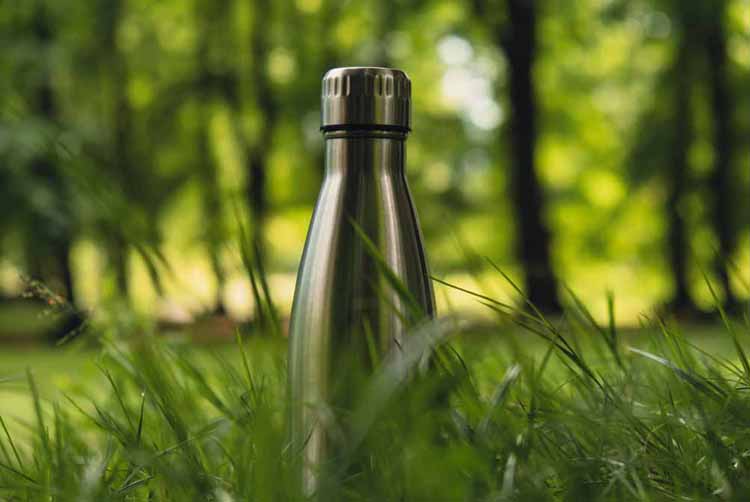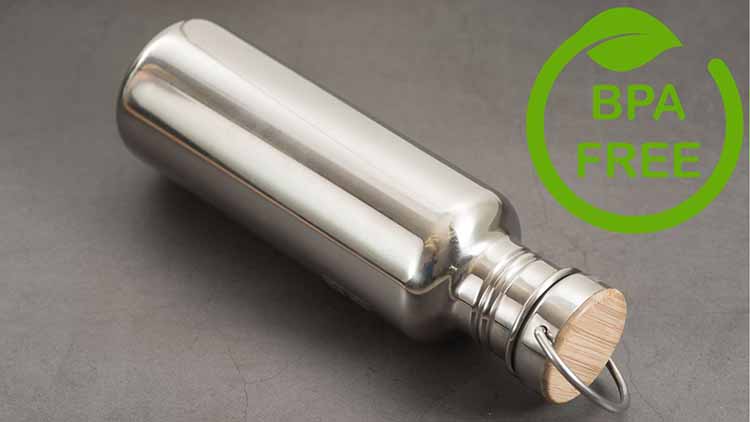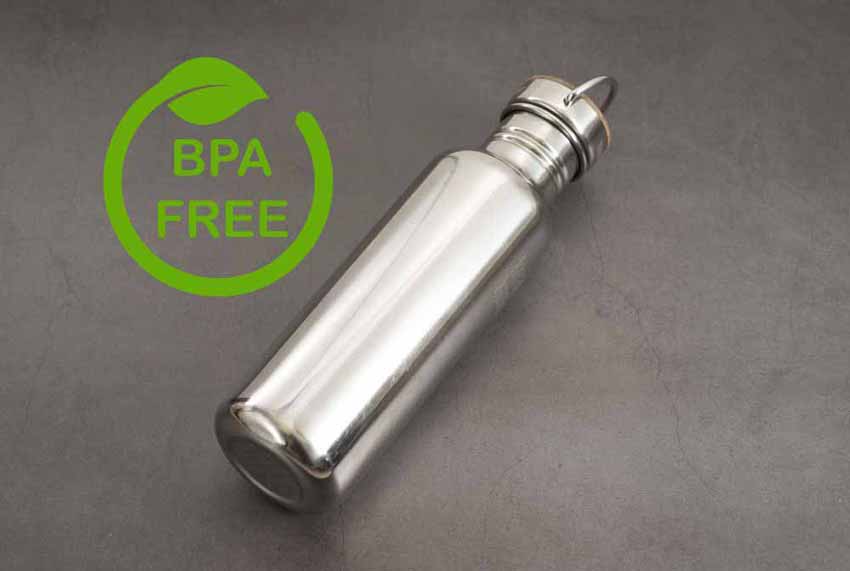We appreciate your concerns regarding BPA and water bottles. BPA has been a threat to our health. However, many people drink from single-use plastic water bottles that carry a high risk of BPA leaching into the drinks.
So, what’s the solution? What about other materials? Are stainless steel water bottles BPA Free?
Yes, stainless steel itself doesn’t contain BPA and it’s completely safe to drink from. However, some bottles might have BPA-containing plastic components, which can be a matter of concern.
This article will clear up any doubts and help you make an informed choice by explaining how stainless steel bottles are made, what to look for, and how to ensure your bottle is truly BPA-free.
What Is BPA and Where Is It Found?
BPA, or Bisphenol-A, is an industrial chemical used to make strong, durable plastics and epoxy resins. Manufacturers commonly use BPA in polycarbonate plastics for products like reusable water bottles, food containers, and, in the past, baby bottles.
Here’s where else BPA is found-
- Plastic food containers and packaging
- Feminine hygiene products
- Eyeglass lenses
- Dental filling sealants
- Sales receipts
- Household electronics
- CDs and DVDs
- Sports equipment
Not all bottles contain BPA. Stainless steel and BPA-free plastic bottles are safe choices. However, some aluminum bottles with epoxy linings might still have BPA.
BPA can leach into drinks and food, especially when exposed to heat or acidic liquids. Studies have linked BPA exposure to hormonal imbalances, potential effects on brain development, increased blood pressure, and risks of diabetes and heart disease.
Recommended: Slim Stainless Steel Water Bottle

Are Stainless Steel Water Bottles BPA Free?
Stainless steel water bottles are made from food-grade stainless steel, generally labeled as 18/8 or 304 stainless steel. This material is strong, BPA-free rust-resistant, and perfect for keeping drinks hot or cold.
Unlike aluminum bottles, stainless steel doesn’t need an inner lining because it won’t react with your drinks, even if they’re acidic.
The bottle’s construction includes two main components:
- The body is made entirely from stainless steel. The body’s smooth, non-reactive surface ensures there is no risk of BPA exposure.
- And the cap, which can be made from stainless steel, BPA-free plastic, or silicone.
Stainless steel itself doesn’t contain BPA, so the bottle body is naturally safe. However, the caps and seals might include plastic parts. If the plastic isn’t BPA-free, you could still be at risk.
How to Ensure Your Stainless Steel Bottle is BPA-Free
Stainless steel by design is naturally free from BPA, but there are a few steps you can take to confirm this and avoid any confusion:
Check the Product Label
Most reputable brands that sell stainless steel bottles clearly label their products as BPA-free. Look for labels that mention “BPA-free” or “food-grade stainless steel.” These terms indicate that the bottle is safe for drinking and won’t leach harmful chemicals.
Look for Certifications
Some bottles come with certifications like “FDA approved” or “BPA-free certification.” You can rely on the bottles as the product meets safety standards and is free from BPA and other harmful chemicals.
Buy from Trusted Brands
Reputable brands often ensure their products are BPA-free due to increasing demand for safe, non-toxic items. Choose from a well-known, trusted brand that prioritizes consumer health and safety.
Recommended: BPA Free Stainless Steel Water Bottles

How Can You Avoid BPA in Daily Life?
Avoiding BPA is easier than you might think. Here are a few tips to help you stay BPA-free:
- Try your best to avoid exposing products that may contain BPA to heat. Heating plastics in the microwave or dishwasher increases the risk of BPA leaching into your food.
- If you want to store leftovers, go for glass containers with BPA-free lids to keep your meals safe.
- Try to limit your consumption of canned foods, as the interior lining usually contains BPA.
- Whenever possible, choose homemade meals over takeaways. This helps you avoid the BPA-laden plastics used in food packaging.
- Whether it’s a water bottle, food container, or baby bottle, always look for BPA-free labels. Stainless steel, glass, and BPA-free plastic are excellent choices. Avoid polycarbonate plastic bottles, which often contain BPA.
- Lastly, look for alternatives to plastic in your daily life to further reduce BPA exposure.
Is Stainless Steel Safe and Eco-Friendly?
Yes, stainless steel is both safe and eco-friendly, which makes it a popular choice for a variety of products. Here’s why it stands out:
- Safety: Stainless steel is non-toxic and free from harmful chemicals like BPA. It doesn’t leach chemicals into food or drinks, ensuring that what you consume remains safe.
- Durability: Stainless steel is highly durable and can withstand wear and tear much better than plastic. It’s resistant to breaking, cracking, or chipping, meaning it will last much longer.
- Recyclability: Stainless steel is 100% recyclable. Unlike many other materials that lose quality during recycling, stainless steel can be recycled over and over without degrading.
- Lower Environmental Impact: Manufacturing stainless steel requires less energy over its lifespan compared to plastic, which also contributes to lower carbon emissions. By choosing stainless steel products, you are reducing your environmental footprint.
- Long-Term Sustainability: Products made from stainless steel, like reusable water bottles, can last up to 12 years with proper care. It greatly reduces the need for disposable plastic bottles and minimises single-use waste.
Last Thoughts
So, that’s all about the confusion “Are stainless steel water bottles BPA Free?”
Stainless steel water bottles are naturally BPA-free, which makes them a safer option compared to plastic bottles. To ensure your bottle remains BPA-free, always check for clear labeling, and choose reputable brands.

